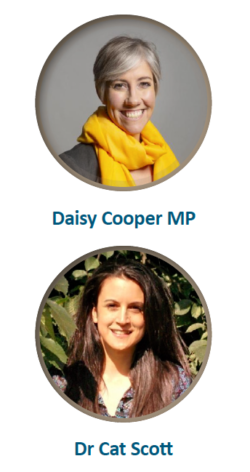Tree planting and the road to net zero
Daisy Cooper MP and Dr Cat Scott of the University of Leeds call for central government funding to support woodland creation alongside the planting and maintenance of trees outside woodlands, with support for local authorities to monitor this and coordination across all four nations of the UK.

Planting and restoring trees and woodlands will play a critical role in tackling both the climate and biodiversity crises the world currently faces. Trees are one of the most effective and cheapest ways of taking carbon out of the air, but critically they also provide a number of other environmental and social benefits.
 In an essay published today, LEAF Director Dr Cat Scott and Daisy Cooper MP call for greater long-term government support for the planning and maintenance of new trees and woodlands.
In an essay published today, LEAF Director Dr Cat Scott and Daisy Cooper MP call for greater long-term government support for the planning and maintenance of new trees and woodlands.
The UK has one of the lowest levels of woodland coverage in Europe at just 13% but this UK wide average masks a discrepancy between the nations. Scotland has canopy cover of 19% and Wales 15%, with England and Northern Ireland at only 10% and 9% respectively.
The current Government target is to create 30,000 hectares of new woodland per year across the UK by 2025. In recent years, UK planting rates have fluctuated between highs of around 13,000 hectares (e.g., 2019-2020) and lows of less than 6,000 hectares (e.g., 2015-2016) per year; even the highest recent planting rate is less than a third of the Government’s new target.
The essay is part of the Net Zero Exchanges collection that draws together voices from across the political spectrum and from a range of leading UK universities.
With the UK hosting COP26 in November, the Government urgently needs to align domestic policy with global climate commitments. The Net Zero Strategy, due before COP26, offers a vital opportunity to do this.
The Net Zero Exchanges essay collection blends politics and science: politicians working with academics to understand not just climate science but the science of the political solutions. Each essay is co-written by an academic and a Parliamentarian and sets out the areas where work is still needed on climate policy and also demonstrates how readily to hand many policy and technical solutions are. It showcases the strength of UK science and research and the level of cross-party support for climate action.
“Pairing academics with MPs has enabled us to produce essays that place the latest research in the context of conversations going on at the heart of parliament. Hopefully this collection will be a valuable resource for policy-makers working on issues around net-zero” said Dr Cat Scott.
Caroline Lucas MP, Chair of the All-Party Parliamentary Group (APPG) on Climate Change said, “The APPG on Climate Change was founded to coincide with the passing of the 2008 Climate Change Act – a vote that achieved almost unanimous support from across the political spectrum. As current Chair of the APPG on Climate Change, I see great value in striving to maintain and build upon this cross-party consensus where possible. We won’t all agree on the necessary course of action in each sector. And we may not even agree on the speed or scale with which it is necessary to reduce emissions. But we share a common conviction that the climate crisis is a challenge that can and must be surmounted. Deeper engagement between parliamentarians and the scientific community is a vital step in ensuring that we do. It is in that spirit that I fully endorse the work that has gone into producing this collection of essays.”
Read the full collection of essays here: https://www.policyconnect.org.uk/research/net-zero-exchanges-connecting-policy-and-research-climate-action

